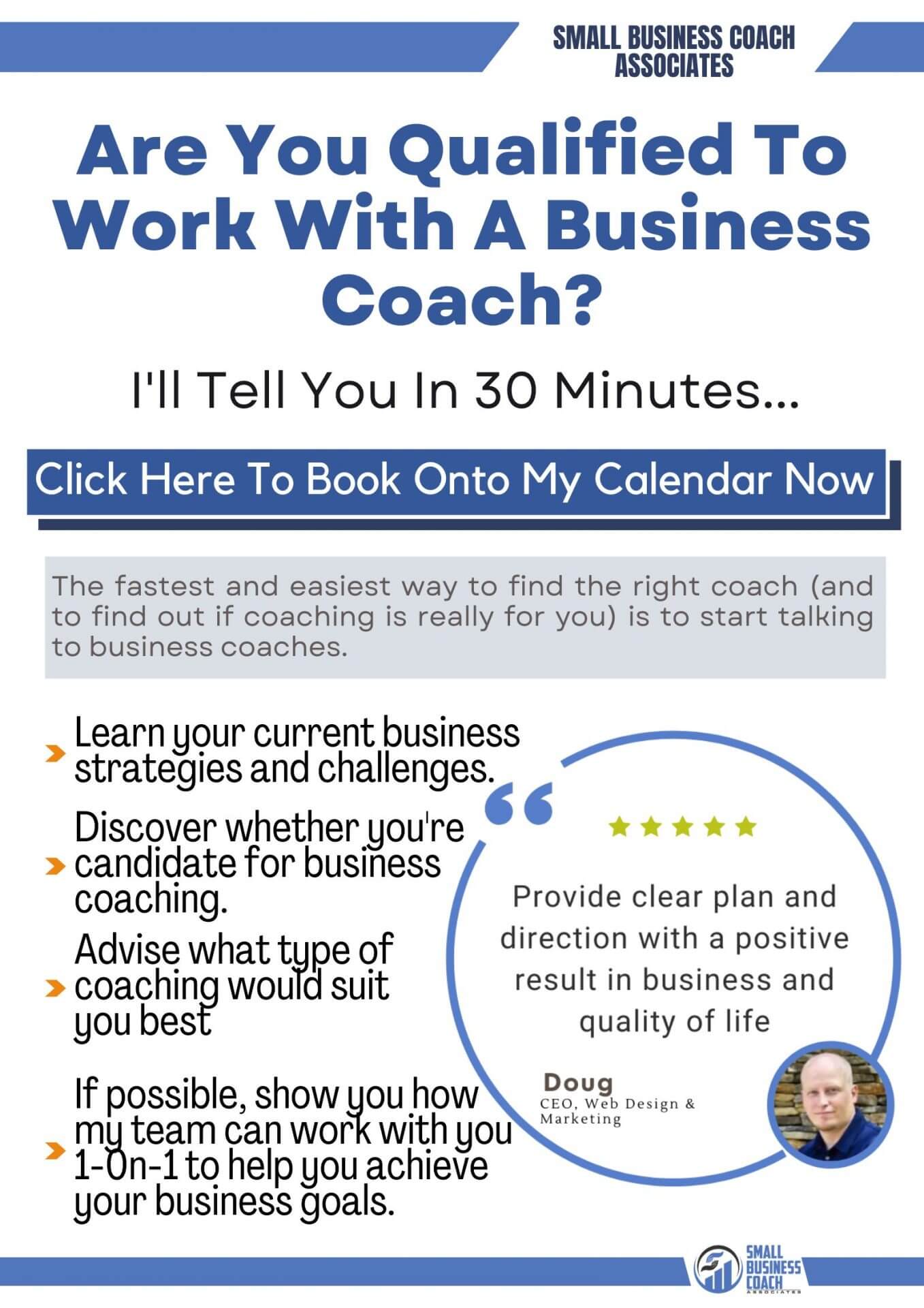VIEW BY TOPIC
- Finding Customers
- Business Systems
- Managing Employees
- Leadership
- Managing Money
Related Posts

Ready to Grow Your Business Fast?
Here’s How I Grew Five Businesses, and Eventually Sold One to a Fortune 500 Company.

21 Marketers Share Marketing Strategies For Small Business
21 Marketers Share Marketing Strategies Every Small Business Can Afford
Starting a business requires a lot of work, time and effort. Marketing strategies are essential to a successful business.
After you define your offering and your target audience, you need to find a way to reach them. Marketing is a crucial part of establishing your brand and generating sales leads for your small business.
In this post, we discussed with 21 experienced markets the best marketing strategies that will help you grow your small business both in size and reputation.
Michael Hammelburger, Sales Therapy Sales Coaching

One work: Networking. With many networking meetups starting up again you should do everything you can to join. Meeting with other small business owners is not only a great opportunity to get direct clients, but also a way to be top of mind for them in the future.
Michael Rossman, MachFast

There will always be key digital channels that small business can rely on to drive traffic, the likes of PPC, SEO and Social ads will always be viable. But they may not always be affordable. CPCs having been rising every year, and good SEO is not cheap, and also takes time to build up.
This is where Google My Business (GMB) can come in very handy for small business. If you have a physical store, office or clinic etc you need to set one up.
Setting up a Google My Business profile is free, and will get allow you to potentially rank in the local map pack for localized search terms. Once you have you profile set up you’ll just need to request a pin to verify the location and fill out your profile as much as you can.
Make sure you set the correct categories, add products and services and start regularly posting. You’ll also want to start collecting reviews. All of these will help you rank better in local search results which will be vital in driving local customers and awareness in the early days.
As a top tip, make sure you use a URL with UTM parameters within your profile, you’ll be able to see how much traffic your GMB listing is bringing in and if it’s converting.
Anders Rydholm, PrimeTime Web

At PrimeTime Web, we take a comprehensive approach to marketing. Any small business, even with little or no marketing budget has many options to choose from to build more awareness and stronger relationships with their fans and consumers.
This could include more established channels like social media, content marketing, and on-site SEO. It’s also fairly inexpensive to get into affiliate marketing by building up a Niche authority website in your industry and monetizing with advertising or links that earn referral commissions.
However, in a time where rewards from external platform algorithms are at an all-time low, we would recommend focusing on product marketing, influencer marketing, e-mail marketing, and off-site SEO. Influencer marketing through content creators of audio, video, or written word is something you can build on with your credibility and social network.
Check out SparkToro to see where your audience hangs out and which accounts they follow. It’s one of our favorite influencer marketing tools right now.
Adam Walters, Owner muON Marketing

Because most small businesses are strapped for cash most are seeking a flexible and efficient marketing strategy to go with their lower budgets. While it would be nice to do everything all at once to drive traffic and bring in leads (i.e., pay-per-click ads, paper ads, content creation, SEO, etc), the smartest route to take for any small business owner is to focus on their website.
This means first focusing on creating content that is optimized to rank on page #1 on Google Search. We recommend using Search Engine Optimization (SEO) to do this because the value of an article on page #1 will drive more (free) traffic over a longer period of time versus spending money for PPC ads. The extra benefit of having good content on your website is you keep your potential customers from going to a competitor to find an answer.
Feel free to contact us on our website to learn more about SEO or if you would like to see how muON Marketing can help your business succeed. Visit > https://muon.marketing/ 🚀
TL/DR: Write good content using SEO and they will come to your site. Let’s work together!
Quentin Aisbett, Pocket Insights

For the small business, one of the low effort and big impact online strategies is to work on your Google My Business listing. It’s free to manage and doesn’t require an agency to do everything if you have the time.
Customers will find your GMB listing when they search for your business or for relevant services/products within proximity of your business.
There are particular elements to optimizing your GMB listing including:
– Completing the profile
– Choosing the right category
– Adding Questions & Answers
– Publishing weekly Google Posts
– Encouraging customers to upload photos
– Encouraging customers to leave Google reviews
And for those wanting to take the next step with GMB, I would also encourage you to read up on fighting GMB spam. There are a lot of spammy competitors ranking more prominently than you in those local pack (map and results) searches. Unfortunately it’s working for them but you can even the playing field and give your own listing a boost.
Understand what’s against Google guidelines and let Google know about your competitors. For example, do a search for a term you want to rank for with local intent (pest control in Idaho) and click through to ‘view all’ in Google Maps. If you see listings where the business name is stuffing keywords, then ‘suggest an edit’ and go through the process of changing their name.
If it’s appropriate, Google will make the change to comply with their guidelines and your competitor will stop ranking for the spammy terms. Giving you a better chance of ranking.
Nicholas Scalice, GrowthMarketer

The #1 marketing strategy I’d share right now is to create a newsletter. But not just any newsletter, something you’re passionate about and know can bring value to a specific niche. Be focused with your topic, and don’t talk about yourself. Share amazing content, whether it is curated from various sources, or a case study that you write from scratch.
Why are newsletters so great? Well, for one thing, the value of an email subscriber is much higher than the value of a social media follower or a page “like.” Plus, you have multiple opportunities to monetize a newsletter while building awareness for your brand on a weekly or monthly basis.
There are many tools that can help you get started with your own newsletter, such as ActiveCampaign, ConvertKit, and Substack. But more important than the tools you use is the content you share—and how consistently you share it. So, be consistent, add value with each edition, and have fun! Newsletters are back and better than ever.
Justin Herring, YEAH! Local

Small businesses frequently have a limited marketing budget, which can make promoting your company difficult. The good news is that there are a plethora of free (or low-cost) alternatives for you to sell yourself to your clients.
Here are 5 I suggest starting with:
1) Create a Free Google My Business Listing
A Google Business Profile has become one of the most efficient free marketing tactics available, especially for small businesses. The free listing will allow your company to appear on Google Maps, Google Search’s local section, and the right-hand Knowledge Panel for brand queries.
2) Engage in Local SEO
The best thing about Google’s algorithm is that it’s built to deliver the most accurate, high-quality, and relevant results for each given search query. Because it is not necessary to pay to play, the playing field is leveled, allowing local smaller businesses to compete with large corporations for page one real estate. Start by adding location keywords in your page title and descriptions.
3) Create an Email Marketing Strategy
Email marketing is an excellent approach to attract new visitors and retain ties with existing consumers. Even though email marketing isn’t new, it’s still one of the most reliable ways to get a good return on your marketing dollars. Use MailChimp for a free platform to get started with.
4) Create a Referral Program for Your Customers
For introducing new clients, provide existing customers a free product, a free month of service, or some other very good incentive. Remember that word-of-mouth is quite powerful, and consumers referred by other customers are especially valued, therefore friends informing friends about your business is extremely beneficial.
5) Launch a Facebook Marketing Campaign
Even if you just have a small advertising budget, Facebook ads may be sufficient! Facebook advertising can have a very low cost per click. Just make sure to target your specific city and only the target prospects who you know are interested in your type of business. Start at $5 a day and increase from there.
Kevin Dam, Kevin Dam

I can’t emphasize enough how wonderful Partnerships are! The benefits of your partnerships may last for years if they are properly nurtured and cared for. This might be as simple as a referral program.
The most crucial thing to take away is that collaboration should be mutually beneficial, so make sure you know what your partner values – it doesn’t have to be new clients for them; it might just be a one-time financial incentive.
I started by thinking about the service providers my clients would engage, either before or after they work with me, and came up with this list:
– web developers
– web hosting companies
– branding and graphics designers
– content writers
– other marketing agencies
What providers do your clients go to for help?
Start making a list of the potential partnerships you can nurture and reach out to people of influence from the service providers that you can provide mutual benefits to.
Another way to find more prospects for your business is to do the following:
- Find a “”how-to”” article in your field of expertise and follow the techniques in the article to learn how to do it yourself.
- Make a list of email addresses for individuals who have liked, commented on, or shared the post before. Chances are they engaged the post because they’re thinking about doing it for themselves
- Record a video of yourself implementing the ‘how-to’ article
- Offer to implement the same for someone on the list via email and include your video
The important takeaways from these steps are:
- You’re leading with value and not asking for anything
- You’re demonstrating you can do what was outlined in the article with video proof
- You’re taking the initiative and time to give them value
- You’re providing something they’re most likely interested in since they engaged with the how-to article
Best of luck!
Tommy Gallagher, TopMobileBanks

More often, Small Business is servicing a local community. As a result, it has close relationships with partners and clients.
This happens organically, but that doesn’t mean that a small business owner shouldn’t leverage it. Build trust and friendship.
That doesn’t cost much, if anything, but requires changes to the daily business lifestyle.
Become a brand of your small business. Everyone should know you in the community and beyond. Your clients and partners should see that you live your business.
Have active social profiles. Post regularly about your business AND your life.
Visit your place of business often. Communicate there as much as possible.
Run giveaways to your local community.
Build yourself as an expert in the field. Publish expert details of your business. Participate in the trade shows.
Partner up with other small businesses you like and launch cross-promotional campaigns.
Leveraging your business trust and reliability in the customers’ eyes will significantly impact your sales.
Nestor Vazquez, SEO Mexico
It’s difficult to find good business strategies. Many concepts work well for larger businesses, but they don’t produce the same results when utilized in smaller enterprises. This is because it’s difficult to find strategies that can be successfully implemented on a small budget. However, there are strategies every startup or small business can afford!
Start a Blog – One strategy every startup or small business should consider is starting a blog. A blog gives your company the ability to post content on an ongoing basis and establish a voice for your brand.
Keep It Simple – Another affordable strategy any startup or small business should consider utilizing is keeping things simple for customers. As most startups and smaller enterprises are already operating on a limited budget, there’s no reason to make it more difficult for customers to find information on your website.
Let’s face it, most people don’t want to navigate through multiple pages of content when all they need is in front of them. So why not save yourself the trouble and offer up what you have in one simple page?
Eduard Agapie, Sortlist

One of the cheapest marketing strategy for small businesses is social media. You don’t need to invest anything, you just have to share good content, be creative and engage with your audience! Researching and using the right hashtags and the right tone of voice for your business only costs time.
There are many platforms you can grow an audience on like Instagram, Facebook and even Tik Tok is becoming an essential platform for businesses. Building a blog on your website will also be a minimal investment. Researching related topics and publishing content will also costs you next to nothing. Writing a good blog can drive a lot of traffic to your website and make your business known!
Nikola Roza, Nikola Roza- SEO for the Poor and Determined

One marketing strategy that doesn’t cost money and that every small business should be doing is Quora marketing.
Whatever the niche, there are probably hundreds of questions people ask about that niche within Quora.
A smart small business looking for free promotion and marketing would first plow through Quora and record in a spreadsheet every possible question even remotely related to what they’re doing.
Then they’d filter out questions that are too competitive or too outside of their niche.
Finally, with the batch that remains they’d organize those based on competition level and number of views the question has.
Then they’d start plowing through those giving their take on the topic, with a CTA link within each answer pointing to their property.
Pro tip: recently I’ve been playing with Jarvis the AI writer. It’s pretty good for shorter form content , not as good for long form posts.
But, Quora answer are short-form content and Jarvis even has a Quora answer template you can use to streamline Quora post creation.
I recommend it as a time saver, but only in a case if you have several hundred to a 1000+ questions to respond to.
If you have a dozen or so then don’t bother and write them manually.
Jabez Reuben, Thailand Nomads

When it comes to building your small business, you should always consider email marketing. While it may sound like a traditional technique but it still has a massive ROI. Many small businesses ignore this marketing tool as they assume that only big players in the industry can reap benefits from it.
But you use email to improve customer retention and build qualified leads for your business. It gives you an opportunity to reach out to customers and offer your latest products or services easily. You will also be able to learn more about your audience’s likes and dislikes.
The biggest challenge you will face is to develop compelling content to make sure your emails are being clicked. By segregating your customers based on activity or how far down the funnel they are, you can build personalized relationships with customers and nurture them into their first sale or into your loyalty program.
Ricardo Sentosa, Aemorph

There are lots of ways to market your business in 2021 that are very cost effective.
Some include:
Posting on social media such as Instagram or Facebook. Both platforms enable you to reach millions of people with a single post, you just need to make sure you’re connected to and engaging with your target audience.
Another popular one now is Facebook groups! If you do a search for your area of expertise there’s bound to be a group about it on Facebook. By participating in the groups, sharing your expertise and knowledge, you can build trust and allow others to engage with you on what you’re best at doing.
For some others maybe it’s on the rising social platform TikTok. Creating videos that tell an engaging story and getting impressions of you and your brand can help you generate more revenue very quickly and easily!
Garrett Nafzinger, Garrett Digital

The marketing strategy all businesses can afford is working with a marketing agency or professional to build a website that clearly articulates what you do, the pain points you solve, and the things that differentiate your business from the competition.
There are so many companies that don’t pay attention to the value proposition and business differentiators. Doing so will make your business stand out, and it will drive people who visit your website to convert into customers.
Ben Soltana, DigiDux

Small businesses often have a tight marketing budget to work with, which can make promoting your company a challenge. The good news is, there are enough ways for you to market your business. Here some cost effective ways to market your small business.
– Create and optimize a Google My Business account: a GMB profile is one of the most effective free marketing strategies. It allows your business to show up on Google Maps and on the knowledge panel for branded searches.
– Establish a Social Media presence: whether it’s photos on Instagram or blogging on your Facebook page, social media are great to brand your business and create a consumer buzz around your products.
– Join or create a Facebook group: Facebook Groups are underrated. If you choose the right group, the members represent the core of your targeted, engaged audience. To be more specific, potential customers.
– Build an email list: an email list is worth its weight in the gold. Once you have a potential customer’s email address, it’s just a matter of driving some great email marketing flows and campaigns to turn them into customers.
– Guest post on industry blogs: a great way to build backlinks and gain a lot of weight with search algorithms.
– Sign up at HARO as a source: instead of writing the article yourself, you can provide a quote by signing up as a source at HelpAReporterOut.
– Leverage your network: One thing many small business owners forget about is their network. Hitting up your network of friends and family and asking for referrals or testimonials can give you a boost.
Darshan Somashekar, Solitaired

As a strategy for link building, explore the shoulder niches. A shoulder niche pertains to a topic that directly relates to your blog’s core content. All of them revolve around the central message you want to convey to your brand.
They can increase traffic to your website by expanding your content to new audiences. As long as those industries are relevant to your content, you can improve your online presence and authority. Take time to brainstorm for ideas of those related industries.
Choosing shoulder niches will allow you to earn backlinks from authority sources and other bloggers. In your niche, you are constantly competing with other sites. Your website will receive more backlinks if your content deviates even slightly from that of your competitors.
This strategy increases your content’s visibility in search engines because high-quality, relevant backlinks are a ranking factor of search engine algorithms. This neat SEO hack will allow you to grow your website’s traffic more.
Simon Woodcock, Man With A Camera Photography
Starting my photography business with very little spare cash meant I had to be resourceful when looking for ways of getting my brand name in front of potential clients.
I started by immersing myself in learning more about SEO and how I could get Google to look upon my website favorably. One of the best areas for gaining immediate traction in the Google search results is by utilizing your Google My Business listing. I recommend that all new businesses create one and flesh it out with as much information as possible. If you have premises that customers can visit, make sure you add photos of the exterior and interior as well as any photos of your product or service in action.
Encouraging clients to post their photos and reviews also helps enormously. Responding to all reviews, both positive and negative, looks great to potential customers and shows that, as a business owner, you care.
Don’t forget to post updates on the business listing regularly with useful content, special offers or recent events and upcoming occasions. Where possible illustrate these with a photo so they stand out when potential customers are browsing. Creating a library of useful images for these regular postings is a great idea and you’ll find plenty of local small business photographers offering one-off and regular social media packages where they photograph your business and then supply a large batch of relevant images that can be used anytime. Don’t underestimate the value of quality photography! It’s often what will set a business apart from their competitors.
With plenty of trial and error and a large amount of patience when using my learned SEO techniques both on the website and the Google My Business listing I have seen a strong local presence develop and have cemented the website in the top 2 organic search results for some very popular search terms. Don’t be daunted by SEO and don’t try to learn it all at once – learn one thing a week and you’ll be surprised how quickly this valuable information starts to build.
Aaron Hughes, Boost Suite

The most cost-effective marketing strategy that every small business can afford is to build on your existing relationships with past customers.
Past customers have already demonstrated that they trust you and have a need for your product or service so reaching out again is a simple and cheap way to boost your sales.
When you reach out, the first thing you need to ask is about their experience with your company. Was their purchasing experience simple and easy or were there unnecessary barriers? Has your product been reliable and has it lived up to your promises or could it be improved in some way? Have they benefitted from your customer support or could you do more to help them utilize your product or service?
Now comes the marketing part: if they’ve received value from your product, ask them if they anticipate needing more of your product or service in the future. If they do, set a reminder to reach out a little before when they’ll need it to see if you can help them. They already trust you enough to pay for your product or service so if your product or service has lived up to your promises, this should be an easy sale.
Also ask them if they know anyone else who might need your product or service and if they could introduce you. A warm introduction from an exiting customer who has used your product will side-step the necessity to build trust with this new customer as you are leveraging the trust that already exists in their relationship.
The cost of this process (your time) can be even further reduced by using some automated tools to streamline this process. There are systems that can set automatic reminders to follow up with clients and even email autoresponders that will follow up with past clients without you needing to pick up the phone.
Building this into your standard customer follow up processes will boost your sales and conversion rate significantly with very little cost.
James Lee, Monetized Future

I know that sometimes it can be difficult to justify spending additional money on marketing for your small business.
One of the easiest and most cost-effective ways to generate traffic, leads, and sales for a small business is through SEO marketing channels.
Local brick-and-mortar businesses and eCommerce stores alike can benefit from spending time and money building an SEO campaign.
Contrary to popular belief, most businesses do not have an SEO-optimized website, so just investing the minimum effort in an SEO campaign can really produce some quick wins!
If you have no idea where to start when it comes to SEO, there are plenty of resources online that can help you understand the basics. From there you need to evaluate what your direct competition is doing.
What this means is to find businesses that are ranking for the keywords most likely to bring you new customers, and reverse engineer their efforts, applying them to your own site.
Shaurya Jain, Attention Always

Use LinkedIn
One super low-cost marketing idea that’s working for me right now is LinkedIn. The organic reach on the platform is mind blowing.
LinkedIn is a powerful social media site that doesn’t get the attention it deserves because so few people know how powerful it can be. Most people inflate their network connections and sleep on it. Use the platform to create discussions with your connections, share full/part of your blog posts, share your offers, contribute to groups and above all share other people’s content. The thing is this—each piece of content you share lives on your network’s feed for days and sometimes weeks. Know what that does? It gets engagement.
LinkedIn is a good platform to educate your potential audience. This helps you build your brand while earning trust while improving your reputation. Encourage your employees to be active on the platform as well. And it’s not just B2B businesses that can benefit. If used creatively, the platform is a boon for B2C businesses as well.
This LinkedIn strategy is free and doesn’t require a lot of time or resources from your end. Despite that, you get to maximize your reach and build on your success.












